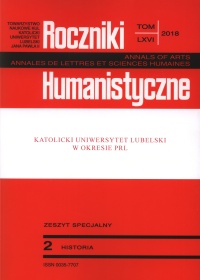Censorship against the Catholic University of Lublin 1944-1989
Abstract
The Politics of the People’s Republic of Poland towards the Catholic University of Lublin was an emanation of the communists’ attitude to the Catholic Church, which had established authority in Poland for centuries. When the communists’ authorities decided to exacerbate the conflict with the Church, it had many opportunities to influence the only Catholic school, thus influencing its activity and face. At the level of persecution and repression, if we reject the last resort, ie the closure of an institution, it has at its disposal both explicit pressure mechanisms and the ability to conduct secret, behind-the-scenes activities. And eagerly used both of these ways. Influenced the limitation of inflows by undercutting the financial liquidity of the university; Set barriers to recruitment; Forced to close uncomfortable directions and did not allow or hinder the creation of new ones; Affected the withdrawal of the right to conduct doctoral dissertations and habilitation; It sanctioned the dissemination by the special services of the academic community, the surveillance of students and university staff, in extreme cases leading to relegation or renewal of the employment contract. Censorship with its actions was a perfect fit in this harassment, limiting access to thought and, in some cases, even by affecting the transmission, whether by refraining from publication or, As a rule, interventions were used to eliminate parts of the text, or to make specific changes to the wording.
Speaking of censorship, we only touch the effects of political decisions that have taken place elsewhere. One should therefore remember who in the real world really controlled the content of the message, ie the role of the PPR and later the PZPR in creating the Peerelian reality and in creating the image of the world. Censorship was solely an auxiliary role, defending the interests of this single party, constituting the last block of independent thought and words.
References
Bazydło J., Wspomnienia pozyskane w ramach projektu „Pamięć Miejsca – Historia Mówiona” Ośrodka Brama Grodzka – Teatr NN w Lublinie.
Cenzura w 1945 r. – Rozporządzenie Ministra Bezpieczeństwa Publicznego w sprawie kontroli środków komunikacji społecznej, oprac. G. Kubicka, „Kwartalnik Historii Prasy Polskiej” 30(1991), nr 1, s. 99-100.
Ciećwierz M., Polityka prasowa 1944-1948, Warszawa 1989.
Długołęcki A., Strategie kontroli. Cenzura PRL wobec „Przeglądu Kulturalnego”, „Więź” 2015, nr 4(662), s. 95-104.
Główny Urząd Kontroli Prasy 1945-1949, opr. D. Nałęcz, Warszawa 1994. Jaszuński G., Kto był pierwszym cenzorem, „Rzeczpospolita” z 23-24 lipca 1994.
Kańduła P., Podstawy prawne oraz kompetencje organów cenzury w Polsce Ludowej, „Disputatio”. Przegląd Naukowy 2009, t. 8, s. 77-92.
Kądziela P., Kościół a państwo w Polsce 1945-1965, Wrocław 1990.
Metody pracy operacyjnej aparatu bezpieczeństwa wobec kościołów i związków wyznaniowych 19451989, red. Adam Dziurok, Warszawa 2004.
Michalski K., Działalność Komisji Wspólnej przedstawicieli Rządu PRL i Episkopatu Polski 19801989, Warszawa 2012.
Nowak P., Cenzura w PRL jako nieefektywna kopia radzieckiej hybrydy leninowsko-stalinowskiej.
Nowe spojrzenie na Główny Urząd Kontroli Prasy, Publikacji i Widowisk, w: „Nie należy dopuszczać do publikacji”. Cenzura w PRL, red. G. Gzella, J. Gzella, Toruń 2013.
Nowak P., Skuteczna czy nieskuteczna? Socjalistyczna cenzura w czasach terroru stalinowskiego.
Studium przypadku poznańskiego wydawnictwa Albertinum (Księgarni św. Wojciecha), „Toruńskie Studia Bibliologiczne” 2013, nr 2(11), s. 31-47.
Paczkowski A., Cenzura 1946-1949: statystyka działalności, „Zeszyty Historyczne” (Paryż) 1996, t. 116(494), s. 22-57.
Romek Z., Cenzura a nauka historyczna w Polsce 1944-1970, Warszawa 2010.
Rutkowski T.P., Nauki historyczne w Polsce 1944-1970. Zagadnienia polityczne i organizacyjne, Warszawa 2007.
Sawicki J.Z., Bitwa o prawdę. Historia zmagań o pamięć Powstania Warszawskiego 1944-1989, Warszawa 2005.
Sobczak J., Polskie prawo prasowe, Poznań 1993.
Sobieraj M., Między oporem a lojalnością. Działania SB wobec KUL na przykładzie rozpracowania prof. Jerzego Kłoczowskiego, Lublin 2015.
Stosunki państwo–Kościół w Polsce 1944-2010. Studia i materiały, red. Rafał Łatka, Kraków 2013.
Śmierci nie można oswoić jak psa (rozmowa Łukasza Marcińczaka z Leszkiem Mądzikiem), „Teatr” 2016, nr 2(1180), s. 18-26.
Wojciechowski N., Wspomnienia pozyskane w ramach projektu „Świadek Historii – Historia Mówiona” Ośrodka Brama Grodzka – Teatr NN w Lublinie.
Copyright (c) 2018 Roczniki Humanistyczne

This work is licensed under a Creative Commons Attribution-NonCommercial-NoDerivatives 4.0 International License.





